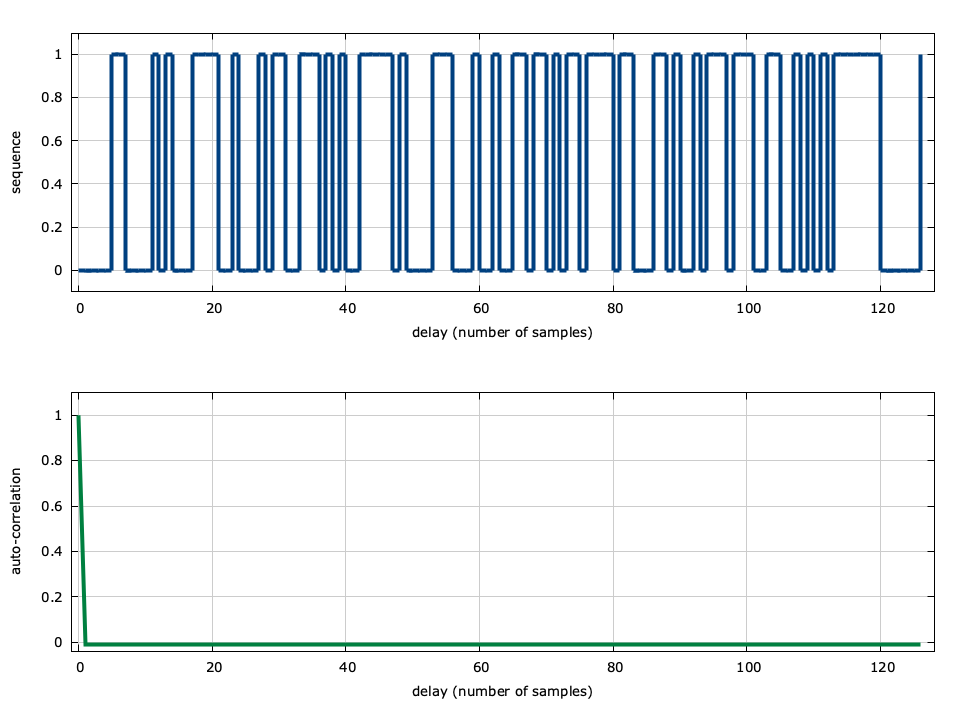Maximal-length Sequence Generator (msequence)
Keywords: msequence maximal length sequence generator linear feedback shift register LFSR
The msequence object in liquid is really just a linear feedback shift register (LFSR), efficiently implemented using unsigned integers. The LFSR consists of an \(m\) -bit shift register, \(v\) , and generator polynomial\(g(x)\) . For primitive polynomials, the output sequence has a length \(n=2^m-1\) before repeating. This sequence is known as a maximal-length P/N (positive/negative) sequence, and consists of several useful properties:
- the output sequence has very good auto-correlation properties; when aligned, the sequence, of course, correlates perfectly to \(n\) . When misaligned by any amount, however, the sequence correlates to exactly \(-1\) .
- the sequence is easily generated using a linear feedback shift register
Only a certain subset of all possible generator polynomials produce this maximal length sequence.
Table [tab-sequence-genpoly]. Default \(m\) -sequence generator polynomials in liquid
| \(m\) | \(n=2^m-1\) | \(g\) (hex) | liquid macro | \(g(x)\) |
| 2 | 3 | 0x00000003 | LIQUID_MSEQUENCE_GENPOLY_M2 | \( x^{2} + x + 1 \) |
| 3 | 7 | 0x00000006 | LIQUID_MSEQUENCE_GENPOLY_M3 | \( x^{3} + x^{2} + 1 \) |
| 4 | 15 | 0x0000000c | LIQUID_MSEQUENCE_GENPOLY_M4 | \( x^{4} + x^{3} + 1 \) |
| 5 | 31 | 0x00000014 | LIQUID_MSEQUENCE_GENPOLY_M5 | \( x^{5} + x^{3} + 1 \) |
| 6 | 63 | 0x00000030 | LIQUID_MSEQUENCE_GENPOLY_M6 | \( x^{6} + x^{5} + 1 \) |
| 7 | 127 | 0x00000060 | LIQUID_MSEQUENCE_GENPOLY_M7 | \( x^{7} + x^{6} + 1 \) |
| 8 | 255 | 0x000000b8 | LIQUID_MSEQUENCE_GENPOLY_M8 | \( x^{8} + x^{6} + x^{5} + x^{4} + 1 \) |
| 9 | 511 | 0x00000110 | LIQUID_MSEQUENCE_GENPOLY_M9 | \( x^{9} + x^{5} + 1 \) |
| 10 | 1,023 | 0x00000240 | LIQUID_MSEQUENCE_GENPOLY_M10 | \( x^{10} + x^{7} + 1 \) |
| 11 | 2,047 | 0x00000500 | LIQUID_MSEQUENCE_GENPOLY_M11 | \( x^{11} + x^{9} + 1 \) |
| 12 | 4,095 | 0x00000e08 | LIQUID_MSEQUENCE_GENPOLY_M12 | \( x^{12} + x^{11} + x^{10} + x^{4} + 1 \) |
| 13 | 8,191 | 0x00001c80 | LIQUID_MSEQUENCE_GENPOLY_M13 | \( x^{13} + x^{12} + x^{11} + x^{8} + 1 \) |
| 14 | 16,383 | 0x00003802 | LIQUID_MSEQUENCE_GENPOLY_M14 | \( x^{14} + x^{13} + x^{12} + x^{2} + 1 \) |
| 15 | 32,767 | 0x00006000 | LIQUID_MSEQUENCE_GENPOLY_M15 | \( x^{15} + x^{14} + 1 \) |
| 16 | 65,535 | 0x0000d008 | LIQUID_MSEQUENCE_GENPOLY_M16 | \( x^{16} + x^{15} + x^{13} + x^{4} + 1 \) |
| 17 | 131,071 | 0x00012000 | LIQUID_MSEQUENCE_GENPOLY_M17 | \( x^{17} + x^{14} + 1 \) |
| 18 | 262,143 | 0x00020400 | LIQUID_MSEQUENCE_GENPOLY_M18 | \( x^{18} + x^{11} + 1 \) |
| 19 | 524,287 | 0x00072000 | LIQUID_MSEQUENCE_GENPOLY_M19 | \( x^{19} + x^{18} + x^{17} + x^{14} + 1 \) |
| 20 | 1,048,575 | 0x00090000 | LIQUID_MSEQUENCE_GENPOLY_M20 | \( x^{20} + x^{17} + 1 \) |
| 21 | 2,097,151 | 0x00140000 | LIQUID_MSEQUENCE_GENPOLY_M21 | \( x^{21} + x^{19} + 1 \) |
| 22 | 4,194,303 | 0x00300000 | LIQUID_MSEQUENCE_GENPOLY_M22 | \( x^{22} + x^{21} + 1 \) |
| 23 | 8,388,607 | 0x00420000 | LIQUID_MSEQUENCE_GENPOLY_M23 | \( x^{23} + x^{18} + 1 \) |
| 24 | 16,777,215 | 0x00e10000 | LIQUID_MSEQUENCE_GENPOLY_M24 | \( x^{24} + x^{23} + x^{22} + x^{17} + 1 \) |
| 25 | 33,554,431 | 0x01000004 | LIQUID_MSEQUENCE_GENPOLY_M25 | \( x^{25} + x^{3} + 1 \) |
| 26 | 67,108,863 | 0x02000023 | LIQUID_MSEQUENCE_GENPOLY_M26 | \( x^{26} + x^{6} + x^{2} + x + 1 \) |
| 27 | 134,217,727 | 0x04000013 | LIQUID_MSEQUENCE_GENPOLY_M27 | \( x^{27} + x^{5} + x^{2} + x + 1 \) |
| 28 | 268,435,455 | 0x08000004 | LIQUID_MSEQUENCE_GENPOLY_M28 | \( x^{28} + x^{3} + 1 \) |
| 29 | 536,870,911 | 0x10000002 | LIQUID_MSEQUENCE_GENPOLY_M29 | \( x^{29} + x^{2} + 1 \) |
| 30 | 1,073,741,823 | 0x20000029 | LIQUID_MSEQUENCE_GENPOLY_M30 | \( x^{30} + x^{6} + x^{4} + x + 1 \) |
| 31 | 2,147,483,647 | 0x40000004 | LIQUID_MSEQUENCE_GENPOLY_M31 | \( x^{31} + x^{3} + 1 \) |
The default generator polynomials are listed in[ref:tab-sequence-genpoly] , however many more exist.
Notice that both the first and last coefficient of each generator polynomial\(g(x)\) is a \(1\) . This holds true for all \(m\) -sequence generator polynomials. The hexadecimal representation of the generator polynomial drops the trailing 1 as this value is implied in the shift register representation. A default generator polynomial for \(m=2\)\((n=3)\) through \(m=31\)\((n=2,147,483,647)\) are provided in the table, above. These default generator polynomials are included in the global liquid.h header file, as well, for convenience.
#include <liquid/liquid.h>
int main() {
// create and initialize m-sequence (length 63)
msequence q = msequence_create_default(6);
// cycle through values and print state
unsigned int i;
for (i=0; i<msequence_get_length(q); i++) {
printf("%u\n",msequence_get_state(q));
msequence_advance(q);
}
// destroy object
msequence_destroy(q);
}
Shown above is a short example program demonstrating how to create an msequence object using the default generator polynomial. The program cycles through the entire sequence and prints the internal state of the shift register, a unique sequence for all values in \(1 \ldots n-1\) , but in a pseudo-random order.
The auto-correlation of the \(m\) -sequence with generator polynomial\(g=\) 0x60 can be seen in [ref:fig-sequence-msequence] . The shift register has seven bits (\(m=7\) ) and therefore the output sequence is of length \(n=2^m-1=127\) . Notice that the auto-correlation is equal to unity with no delay, and nearly zero (\(-1/127\) ) for all other delays.
